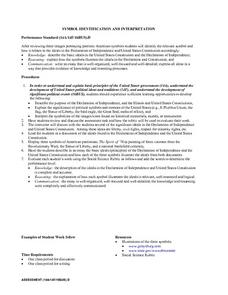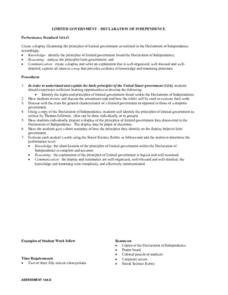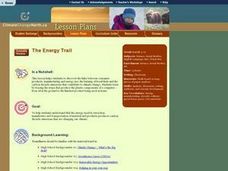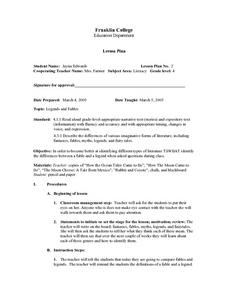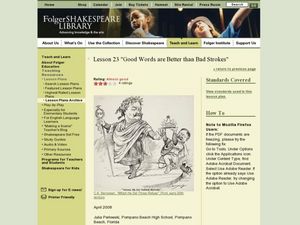Curated OER
Incomplete Plans
Students practice constructing a building utilizing snap cubes and an incomplete building plan and draw the missing view. They identify and compare relationships in two and three-dimensional representations/objects. Each student explains...
Curated OER
Social Studies: Symbols of the United States
Students research the political traditions of the United States at the national and state levels. After discussing various symbols, students compose essays about the principles expressed in the Declaration of Independence and Constitution.
Curated OER
CANDIDATE COMPARISON
Students identify the names of major contemporary political parties. They explain why a person might choose to vote for one candidate for President of the United States over another candidate. They identify the two major political...
Curated OER
PRODUCTION, CONSUMPTION, AND INCENTIVES
Fifth graders design a web page. They include features he or she would typically like to see when visiting web pages. They title the topic of the web page "Features That Make a Great Web Site." They explain that there are incentives...
Curated OER
Limited Government: Declaration of Independence
Learners study the limited government within the Declaration of Independence. They discuss the characteristics of a limited government in contrast to a despotic government. They identify principles of the limited government within the...
Curated OER
HI! HELLO! GOODBYE!
First graders study common forms of courtesy, greetings, and leave-takings appropriate to the time of day. They use common forms of address appropriate to one's relationship with another person's age, rank and number. They draw two...
Curated OER
How Does Light Move?
Second graders investigate how light passes through objects, is blocked, bounces off of things, and bends. They discuss how light moves in different ways, and with a partner walk around the room with a flashlight, shining the light on...
Curated OER
The Energy Trail
Learners examine the relationship between the products they use and energy use. Using the internet, they identify the role that manufacturing plays in using energy and the emissions that change the climate. They discover the steps to...
Curated OER
Is That a Plan? Problem-Solving: Using Diagrams and Models
Student solve problems using a flow chart. They solve real-world problems by using a diagram or model. They create their own diagrams for problem-solving. They explain how they drew the diagram and solved the problem.
Curated OER
Learning About Racial Discrimination
Third graders engage in a lesson plan that is about the study of racial discrimination with the focus upon Martin Luther King Jr. They conduct research using a variety of resources and fill out a graphic organizer looking for information.
Curated OER
Legends and Fables
Fourth graders identify and discuss the differences between legends and fables. They define fable and legend, then as a class take turns reading our books. Students select two of the stories, and complete a Venn diagram, comparing one...
Curated OER
Viking Ships At Sunrise
In this book response crossword, students solve 8 clues and place their answers in the crossword. There is no word bank, but all words pertain to the book,Viking Ships at Sunrise.
Curated OER
What is a Plant?
For this plant worksheet, students will review the origins and adaptations of plants including the alternation of generations. This worksheet has 8 short answer, 6 fill in the blank, and 4 multiple choice questions.
Curated OER
Understanding Idioms
Middle schoolers explore figurative language. In this idioms lesson, students research the origin of instructor-selected idioms. Middle schoolers literally interpret the idioms. Interpretations are photographed and then presented to the...
Curated OER
Seeking Shakespeare in Local Communities
Students explore where Shakespeare exists in local community plays. In this Shakespeare lesson, students create a documentary to define the existence of Shakespeare in their community drama activities. Students participate in community...
Curated OER
Good Words are Better than Bad Strokes
Learners research negative campaigns and propaganda and then interpret characters from Julius Caesar in that light. In this negative campaign lesson plan, students take the character and create visual images to depict the characters in a...
Curated OER
Transportation Math
Students practice their problem solving skills. In this addition and subtraction lesson, students solve story problems regarding the delivery of consumer goods.
Curated OER
Transportation Math
Sixth graders solve transportation themed word problems. In this word problem instructional activity, 6th graders solve transportation themed word problems using critical thinking skills.
Curated OER
Transportation Math
Students explore the concept of exponents. In this exponents lesson, students evaluate various bases to powers. The bases to a given power are in the context of miles driven, stops on a route, and minutes spent in...
Curated OER
General Knowledge of Books #66
In this general knowledge of books #66 worksheet, students interactively answer 10 questions about British and American books and authors with immediate online feedback.
Curated OER
Hyundai Scandal
Students read and discuss an article about a Hyundai business scandal. They complete vocabulary exercises in small groups, take a comprehension quiz and participate in class discussion.
Curated OER
Words In the News- Canada Elects New Government
Students participate in vocabulary building activities to read an online article about Canada. They complete worksheets and an online quiz. They work in groups to to develop policies for holding a class election.
Curated OER
Words in the News: Rabid Vampire Bats Attack Humans in Brazil
Students discuss what they believe the most dangerous animal is. In groups, they match new vocabulary words with their defintions. They read an article about a rabid bat attacking humans in Brazil and answer questions.
Curated OER
Words in the News: Growth in Air Travel Harms Environment
Learners discuss activities that they believe harm the environment. In groups, they match the new vocabulary words to their definitions. They read an article about environmental damage and answer questions.

